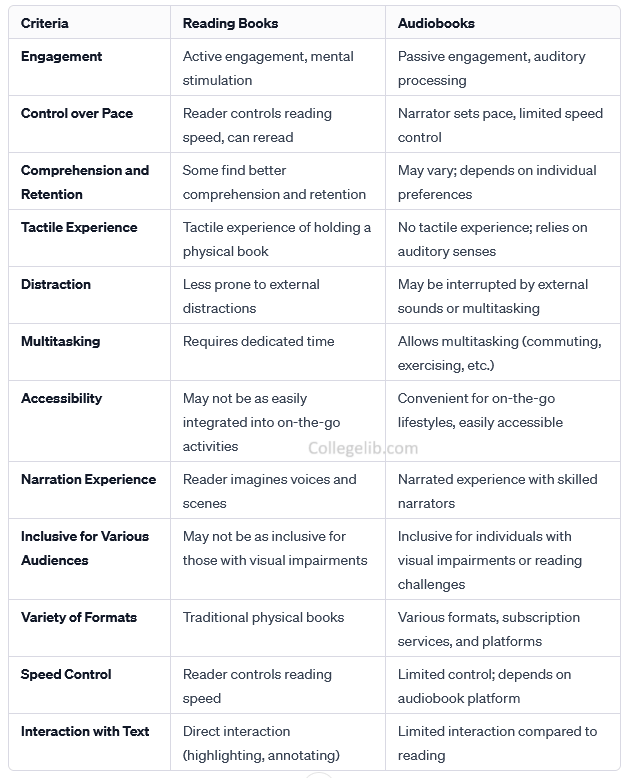The choice between reading books and listening to audiobooks depends on personal preferences, lifestyle, and individual needs. Both formats have their advantages and potential drawbacks. Here are some considerations for each:

Reading Books:
Pros:
- Active Engagement:
- Reading requires active engagement and stimulates mental processes, including visualization and imagination.
- Control Over Pace:
- Readers can control the pace of reading, allowing for reflection on the content and the ability to reread sections if necessary.
- Comprehension and Retention:
- Some individuals find that they comprehend and retain information better when they read, as it allows for deeper concentration.
- Tactile Experience:
- Many people enjoy the tactile experience of holding a physical book, turning pages, and interacting with the text in a tangible way.
- Less Distraction:
- Reading a physical book can be less prone to distractions compared to audiobooks, which may be interrupted by external sounds or the need to multitask.
Cons:
- Time and Accessibility:
- Reading requires dedicated time and may not be as easily integrated into activities such as commuting or exercising.
Audiobooks:
Pros:
- Multitasking:
- Audiobooks allow for multitasking, enabling individuals to listen while commuting, exercising, or doing household chores.
- Accessibility:
- Audiobooks can be easily accessed through smartphones or other devices, making them convenient for on-the-go lifestyles.
- Narrated Experience:
- Some people enjoy the narrated experience, especially when audiobooks are read by engaging and skilled narrators.
- Inclusive for Various Audiences:
- Audiobooks can be a more inclusive option for individuals with visual impairments or those who struggle with traditional reading.
- Variety of Formats:
- Audiobooks come in various formats, offering flexibility in terms of subscription services, one-time purchases, and library borrowing.
Cons:
- Less Active Engagement:
- Listening to audiobooks may involve less active mental engagement compared to reading, as it relies on auditory processing rather than visual.
- Pronunciation and Interpretation:
- The narrator’s pronunciation or interpretation of characters and scenes may not align with the listener’s own mental image or preferences.
- Speed Control:
- While some audiobook platforms allow for speed adjustments, listeners may feel the pace is too fast or too slow.
- Limited Interaction:
- Audiobooks may limit the ability to interact directly with the text, such as highlighting or annotating.
Conclusion:
The “better” option depends on individual preferences, lifestyle, and the context in which you consume content. Some people prefer the active engagement of reading, while others appreciate the convenience and multitasking capabilities of audiobooks. Many individuals find value in using both formats for different purposes. Ultimately, the key is to choose the method that aligns with your personal preferences and enhances your overall reading experience.